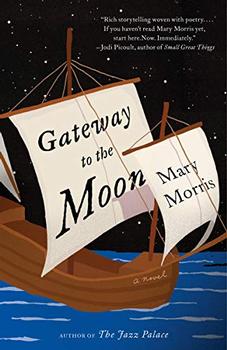Summary | Excerpt | Reading Guide | Reviews | Beyond the Book | Readalikes | Genres & Themes | Author Bio

Chapter One
Perfect Darkness—1992
Miguel Torres stands in the old cemetery and aims his telescope at the sky. It's a clear, cloudless evening. And there's no moon. So it is easier to see the stars when there's no moon. Miguel stumbles as he adjusts his scope. He has difficulty navigating the uneven terrain of tree roots and crumbling stone. Still he likes the old cemetery. It gives him the best view of the night sky. Near the trailer where he lives with his mother, there is too much light. He comes here for the darkness.
A brisk wind blows through the branches of the old oak tree. It blows through piñon trees, and the air is redolent with the scent of pine. But it is also a dry, dusty wind and Miguel has to keep wiping his lens with a soft cloth. He buttons his thin jacket and peers into the eyepiece. Squinting, he pans the sky. It is late spring and a good night to be out. The days are already hot on the high desert plain, but the nights remain cool.
He focuses on Cassiopeia. He likes to begin with this constellation because her major stars form an M. The Celestial M some call it. Or the Lazy M. Whatever the case, Miguel feels as if it's his signature in the sky. From Cassiopeia he moves up to Ursa Major and then over to the North Star. This orients him. Once he gets his bearings, he locates Jupiter and sharpens his focus on its moons. Named after Zeus's lovers, the largest moons of Jupiter and their orbits were what Galileo used to determine that the Earth is not the center of the universe. But, of course, Galileo went to prison, recanted, and spent the rest of his life under house arrest.
Miguel has never been to prison, though he has spent a month in juvenile detention. But juvie was a little more like what he imagined summer camp to be—bunk beds, sports, three meals a day—except for the razor wire. It was a year ago when he'd gotten caught with a gang of his pals playing chicken on the highway, and next thing he knew, the cops were rounding them up. His father, who lives down the road, thought it might be good for him to spend some time straightening out, and his mother didn't argue. He'd shared a room with three other boys and they all had lice. The room had a small window, and the only pleasure he'd gotten that entire month was staring at the night sky. Since getting out, it seems as if that's all he wants to do. As his father likes to say, there are worse things to be hooked on.
Miguel stumbles again, almost toppling over as he makes a fine adjustment to his scope. But then he often stumbles. His feet don't seem to know where the rest of him is going. His mother calls him a long tall drink of water. Over six feet tall, lanky. His muscles haven't caught up with his bones. And those bones have just grown and grown. He is almost odd-looking. He has green eyes like his father. Some of his friends call him the Praying Mantis because he is so skinny and because he falls for girls usually a few years older who are known to devour boys.
As he stands with his feet apart in the cemetery, he can see the skies. He is hoping to find a moon. Not a moon that anyone else has ever found but one of his own. A moon that no one else knows is there. What will he name it? Maybe after a character in Star Wars? Han Solo? Luke Skywalker? Princess Leia? He's always surprised at the names given to the moons. Ganymede, Callisto, Locaste. So why not Star Wars? Miguel can never dream of discovering a galaxy or a comet. Or even a new planet somewhere deep in the Milky Way. That's for people who spend their lives with high-powered scopes fixed to the stars. But it is not out of the question for a boy to find a moon.
Moons have long been a preoccupation of Miguel's. He is drawn to them more than he is drawn to other celestial bodies. Moons are manageable. You can stare at one and it won't hurt your eyes. And they have low expectations. He prefers the cooler, reflected light to the burning stars. In this high desert where Miguel lives, the sun cracks his lips and makes his throat dry. Whenever possible he seeks the shade. If he could, he'd be nocturnal.
Excerpted from Gateway to the Moon by Mary Morris. Copyright © 2018 by Mary Morris. All rights reserved. No part of this excerpt may be reproduced or reprinted without permission in writing from the publisher.
Knowledge is of two kinds. We know a subject ourselves, or we know where we can find information on it.
Click Here to find out who said this, as well as discovering other famous literary quotes!
Your guide toexceptional books
BookBrowse seeks out and recommends the best in contemporary fiction and nonfiction—books that not only engage and entertain but also deepen our understanding of ourselves and the world around us.